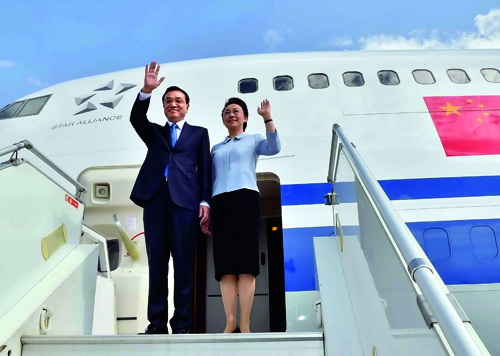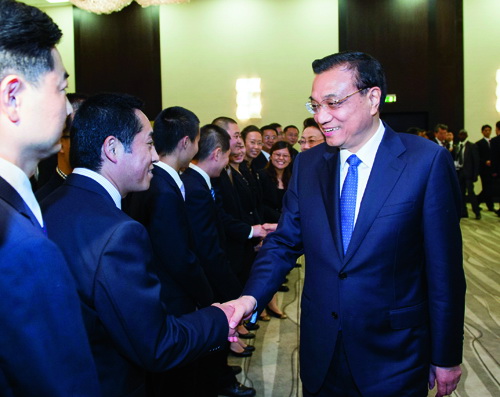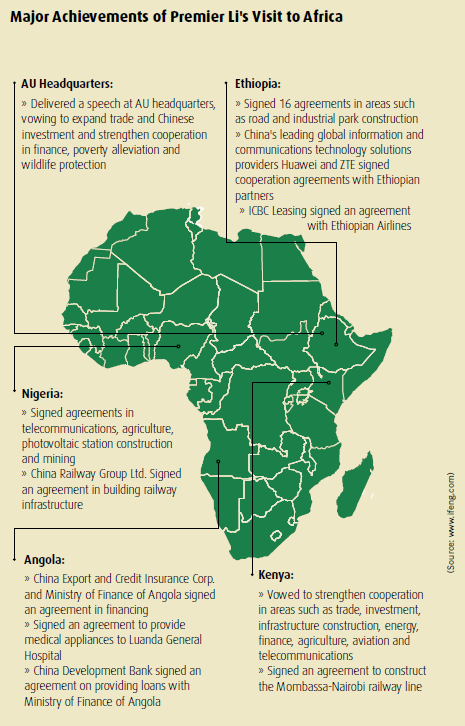|

Li Keqiang and his wife Cheng Hong wave after arriving in Addis Ababa, Ethiopia, on May 4
Legendary Lebanese poet Khalil Gibran wrote: "You may forget the one with whom you have laughed, but never the one with whom you have wept." In the eyes of Chinese Premier Li Keqiang, China and Africa have wept together in their shared history, and are today facing a similar process of development. It is an already tight bond increasingly strengthened by the frequent visit of senior Chinese leaders to the continent, and vice-versa.
From May 4-11, Premier Li visited Ethiopia, Nigeria, Angola and Kenya, as well as African Union (AU) Headquarters in Addis Ababa. When Li wrapped up his maiden eight-day Africa trip as premier, he not only mapped out a clear vision for upgraded Sino-African cooperation framework on the basis of deepening traditional friendship, but also penned several major agreements between China and African countries. These included intergovernmental agreements, projects among enterprises, as well as agreements of cooperation with individual countries and regional cooperation signed in the four countries on his itinerary. Premier Li also attended the 24th World Economic Forum on Africa in Abuja, capital of Nigeria, on May 8.
In his speech delivered at the AU Headquarters on May 5, the premier laid out four principles, outlined six areas and highlighted one platform for China and Africa to upgrade their cooperation (see box).
"This visit has given a very clear picture of where China is and what it means in terms of development in energy, infrastructure and business. It [China] was serious [about] business. It [the visit] not only consolidates Kenya's relations with China, but also increasingly asserts China as one of Kenya's foremost partners," Professor Peter Kagwanja, Chief Executive of Nairobi-based Africa Policy Institute, told ChinAfrica.
Consistent views
Premier Li’s visit to Africa took place on the 50th anniversary of China's late Premier Zhou Enlai's tour to African countries. Fifty years ago, Premier Zhou visited 10 African countries in 55 days, laying a solid basis for the long-lasting friendship between China and African countries.
Comparing the two premiers' Africa visits, Liu Guijin, former Special Envoy of the Chinese Government on African Affairs, believes the past half century saw some changes in China’s engagement with Africa, that is, from provider to partner.
“When Premier Zhou visited Africa, government aid dominated the bilateral relations, mainly from China to African countries,” Liu told ChinAfrica. He said the gratuitous aid was necessary at that time as China-Africa relations were in the initial stages and a large number of African countries were in the struggle for independence. “Supporting African nations in their independence efforts was a main consideration of China in developing its relations with African countries,” Liu said.
During his visit, Premier Zhou put forward five principles guiding China’s relations with Arab and African countries and eight principles for China’s aid to foreign countries. These included equality, mutual benefit and attaching no conditions in providing aid to other countries. In his speech at the AU Headquarters, Premier Li reiterated these principles and vowed to continue with them, indicating China’s Africa policy is consistent.
With the passage of time, there has been a need for upgrading its foreign policy. Since the early 1980s, China has put greater stress on mutually beneficial cooperation with foreign countries. According to Liu, while continuing its aid and traditional government-to-government assistance, China has encouraged more two-way cooperation rather than being rigid with one-sided aid. In Liu’s eyes, China-Africa ties are two-way. While China helps Africa, the continent in return also helps China in its own development, creating the foundation of win-win cooperation, Liu said.
“You will never see China calling itself a donator, but a partner,” stressed Liu. “China also needs external support in maintaining its rapid economic development.”
 Li Keqiang meets Chinese medical team in Angola
Li Keqiang meets Chinese medical team in Angola
All we do is win
Mutually beneficial cooperation was a key phrase during Premier Li’s recent Africa tour. On May 11 in Kenya, he and other African leaders oversaw the signing of the Mombassa-Nairobi railway deal. The railway will extend for 609 km from the Indian Ocean port city of Mombassa to Nairobi, with its construction to cost about $3.6 billion. Ninety percent of the financing will come from China Exim Bank. It is the first section of East African railway network, which, according to its long-term planning, will connect Kenya, Tanzania, Uganda, Rwanda, Burundi and South Sudan in East Africa.
“This project is important because it will lay a sound basis for economic integration of the whole African continent,” He Wenping, Director of African Studies of Institute of West Asian and African Studies, Chinese Academy of Social Sciences, told ChinAfrica.
She noted that the East African Community is in the steady process of regional integration, and interconnectivity among these countries will be a great breakthrough during the process. “Without development of a transport network and smooth connectivity, it is impossible for African countries to expand their economy at a faster pace and realize intra-regional trade,” said He. “African countries require strong infrastructure support, and China has the ability to meet this need. This is a good way of win-win development.”
Social responsibilities
Such win-win cooperation will increase in the future with more Chinese enterprises coming to Africa. Statistics show that by the end of 2013, more than 2,500 Chinese enterprises were operating in Africa, with the stock of direct investment exceeding $25 billion. While creating more than 100,000 job opportunities for local people, these companies’ products and services, as well as the social responsibilities they perform, were also a concern of Premier Li during his tour to African countries.
In every stop of his tour, he took the time to meet representatives of Chinese enterprises there, urging them to pay much attention to their behavior in Africa and implement prudent corporate social responsibility.
“Every Chinese enterprise here should abide by local laws and respect local people’s customs and lifestyle,” stressed the premier while visiting a Chinese project in Addis Ababa on May 6. “You should not only complete the project with high speed, but also protect the local environment and fulfill corporate social responsibilities.”
It was not the first time that he has emphasized corporate social responsibilities of Chinese enterprises operating overseas. At the first press conference after he became Chinese premier last year, he vowed to do more work to urge Chinese enterprises in other countries to improve this aspect of their operations so as to improve China’s international image.
“They [Chinese enterprises] represent China and they should provide high-quality products and services to African consumers and fully fulfill their corporate social responsibilities so as to maintain China’s international image [as a responsible country], and to contribute to the profound China-Africa friendship,” Liu Guijin said.
China's 4-6-1 model for improving relations with Africa
Four Principles: China will follow the four principles of operating with sincerity and as equals; enhancing solidarity and mutual trust; jointly pursuing inclusive development; and promoting innovative and practical cooperation.
Six Areas: China will carry out cooperation in six major areas, namely, industrial cooperation, financial cooperation, cooperation on poverty reduction, cooperation on environmental protection, cultural and people-to-people exchanges, and cooperation on peace and security.
One Platform: China will upgrade China-Africa cooperation in response to new development needs of Africa and elevate the new strategic partnership to the next level.

|